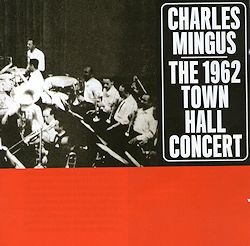Charles Mingus (bass & bandleader)
Clark Terry (trumpet)
Ernie Royal (trumpet)
Snooky Young (trumpet)
Richard Williams (trumpet)
Rolf Ericson (trumpet)
Ed Armour (trumpet)
Lonnie Hillyer (trumpet)
Britt Woodman (trombone)
Quentin Jackson (trombone)
Willie Dennis (trombone)
Eddie Bert (trombone)
Jimmy Cleveland (trombone)
Paul Faulise (trombone)
Don Butterfield (tuba)
Danny Blank (contrabass clarinet)
Romeo Penque (oboe)
Eric Dolphy (alto sax)
Charlie Mariano (alto sax)
Charles McPherson (alto sax)
Buddy Collette (alto sax)
Zoot Sims (tenor sax)
George Berg (tenor sax)
Pepper Adams (baritone sax)
Jerome Richardson (baritone sax)
Warren Smith (vibraphone & percussion)
Toshiko Akiyoshi (piano)
Jaki Byard (piano)
Les Spann (guitar)
Milt Hinton (bass)
Dannie Richmond (drums)
Grady Tate (percussion)
rec Town Hall, New York, USA on October 12, 1962
*bonus track
Jimmy Knepper (Trombone)
Booker Ervin (tenor sax)
Rahsaan Roland Kirk (tenor sax, manzello, stritch)
Charles Mingus (bass & leader)
Doug Watkins (bass)
Dannie Richmond (drums)
rec. New York, USA on November 6, 1961
All compositions by Charles Mingus except In A Mellow Tone (Duke
Ellington, George Duke & Milt Gabler)
PHOENIX RECORDS 131569 [78:16]
This CD is a recording of a true piece of jazz history and an attempt
to right a lot of wrongs. For a long time Charles Mingus, one of the
greatest innovators in jazz history, had wanted to play the New York
Town Hall and to treat it as an experimental workshop with a large
32 piece orchestra playing some of Mingus’ original compositions work
shopping them live warts and all along with other songs from his career.
However, it seemed as if everything conspired to make it a concert
fraught with difficulties. For a start the date was inexplicably brought
forward by 5 weeks by the record company United Artists and it can
only be imagined how difficult Mingus must have found complying with
such an idiotic demand when so many musicians were involved. Several
of the numbers are cut short by Mingus before their end but then Mingus
had never even intended it as a public concert or to have it recorded
and both of those things were the record company’s idea. His idea
was simply for it to have been a public recording date and that the
public would not have been asked for any admission charge. During
the performance he even advised the audience to ask for their money
back though he couldn’t be heard since the microphone wasn’t switched
on! The change of date naturally resulted in little rehearsal time
and coupled with poor sound and interruptions the record which finally
included just 36 minutes of music, and disgracefully didn’t even bother
listing the personnel, was understandably regarded as a fiasco and
a disaster. In 1994 Blue Note did their best to correct some of the
worst facets of the original and cleaned up the recording.
The present CD goes one better by including a studio recording of
Peggy’s Blue Skylight from 1961 as a bonus track because
Jimmy Knepper the trombonist and member of Mingus’ band at the time
of the concert was not playing on the recording. This was because
a further twist of fate had intervened in the shape of an argument
between Knepper and Mingus just before the concert was due to start
during which Mingus punched Knepper on the jaw almost destroying Knepper’s
embouchure and leading to Knepper suing Mingus for assault. The bonus
track has other jazz greats playing including Rahsaan Roland Kirk.
At the time the original recording was issued with all its faults
the playing was considered as uneven in many cases. I don’t know how
the restoration of the entire concert and cleaning up of the recording
can have altered that but I don’t get any sense of unevenness listening
to it now and if there is any I’m lucky not to pick it up; it’s just
great jazz to me.
The disc starts with Mingus’ Freedom which is one of his
musically political statements for which he was famous; Mingus was
someone who was prepared to take a stand over the way black people,
indeed all the oppressed in the world, were treated, and ‘the devil
take the consequences’ as far as he was concerned. This is another
reason I rate him so highly and it led to some seminal works in jazz
that included Fables Of Faubus. All the music is brilliant
and there are some standout moments when some of the wonderful musicians
give it their all and a good example is a dialogue between Mingus
and Eric Dolphy as well as some of Clark Terry’s solos. The CD includes
three extracts from Epitaph which Mingus famously quipped
he had written for his tombstone, never expecting to play it. Gunther
Schuller made an attempt to play the entire work or rather as much
as existed at the time of Mingus’ death and in 1989 he premiered it
in a concert in New York. That was a fitting tribute to Mingus’ musical
genius and this disc is another and is highly recommended.
Steve Arloff
